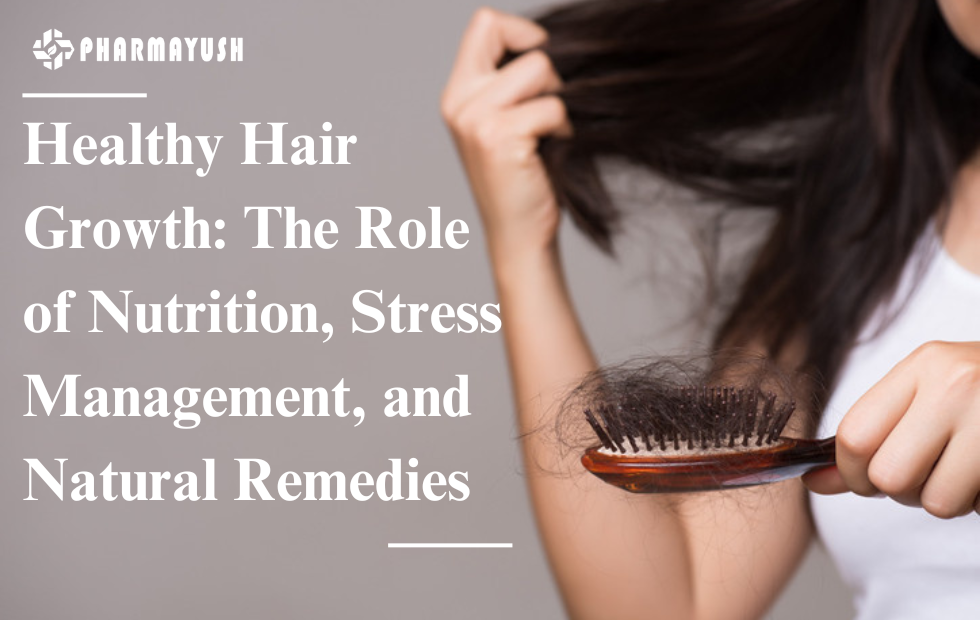Description
This blog explores the issue of hair loss and provides natural remedies and Ayurvedic treatments for promoting healthy hair growth. It covers various reasons behind hair loss, highlights the significance of nutrition, stress management, and gentle hair care practices. Readers can learn about different natural ingredients and precautions to follow for nourishing their scalp and promoting healthy hair growth.
Alopecia, or hair loss, is a common condition that affects lots of individuals across the world. Even though hair loss is sometimes seen to be an ageing phenomenon, it may affect people of all ages and genders. Understanding the causes of hair loss will help you choose the best therapy. Hair loss can happen for a variety of reasons.
Reasons for Hair Loss:
Genetics: Genetics is one of the most frequent causes of hair loss. Androgenic alopecia, commonly known as male or female pattern baldness, is the term used to describe this disorder. Usually, a mix of heredity and hormones is to blame.
Hormones: Hormonal imbalances, such as those brought on by menopause, thyroid issues, or pregnancy, can also cause hair loss.
Medication: Hair loss is a side effect of certain medicines, including chemotherapy therapies.
Stress: Excessive stress can result in hair loss by interfering with the natural cycle of hair development.
Nutritional deficiencies: Hair loss can also be caused by a deficiency in certain vitamins and minerals including iron and vitamin D.
Ayurvedic Treatment for Hair Loss:
An old Indian medical system called Ayurveda provides a number of all-natural treatments for hair loss. These treatments feed the scalp and encourage hair development using herbs, oils, and other organic substances
.
Amla: Amla is a well-known Ayurvedic treatment for hair loss. It is sometimes referred to as Indian gooseberry. It contains a lot of vitamin C and other antioxidants, which support healthy hair development and nourish the scalp.
Bhringraj: Another well-liked Ayurvedic treatment for hair loss is bhringraj, commonly referred to as fake daisy. It is said to accelerate hair growth by increasing blood flow to the scalp.
Coconut Oil: Coconut oil is a natural hair conditioner that can support healthy hair development by nourishing the scalp. The medium-chain fatty acids in it permeate the hair shaft and provide the hair internal strength.
Brahmi: Also referred to as Bacopa monnieri, brahmi is an Ayurvedic herb that is said to encourage hair growth by increasing blood flow to the scalp.
Aloe Vera: Aloe vera is a natural moisturiser that can aid in calming the scalp and encouraging hair development. It has enzymes that can help unclog hair follicles and eliminate dead skin cells from the scalp.
Remedies for Hair Loss:
Massage your scalp with warm oil: Warm oil should be applied to your scalp during a massage to help nourish the area and encourage hair development. Use any oil of your choosing, including coconut oil and almond oil.
Use a natural shampoo: Consider using a natural shampoo instead of one that contains harsh chemicals that might harm your hair and scalp. Making the switch to a natural shampoo can benefit the scalp and encourage hair development.
Eat a nutritious food: A nutritious diet full of vitamins and minerals can assist to hydrate the scalp and encourage hair growth. Eating plenty of fruits, vegetables, and lean meats is advised.
Manage stress: By lowering the production of stress hormones, managing stress through exercise, meditation, or other relaxation techniques can aid in the promotion of hair growth.
Precautions:
Avoid using hot styling equipment: Using hot styling tools can harm the hair and scalp, such as curling irons and straighteners. Use these tools carefully or try to avoid using them altogether.
Avoid tight hairstyles: Avoid tight hairstyles since they can harm the hair and scalp by pulling on them (such as braids and ponytails). Avoid wearing your hair in tight styles or keep it relaxed.
Protect your hair from the sun: The UV rays from the sun can harm your hair and scalp, so shield it from them. When spending a lot of time in the sun, wear a cap or apply a protective hair product with SPF.
Avoid chemical treatments: Chemical treatments can harm the hair and scalp, such as hair colours and relaxers. Avoid or employ these procedures as little as possible.
Be gentle when brushing or combing your hair: When brushing or combing your hair, exercise caution because doing so too roughly might harm the hair and scalp. To prevent harming your hair, use a brush or comb with broad teeth.
Conclusion:
Hair loss can be an upsetting issue, but there are numerous natural therapies that can support healthy scalp function and encourage hair growth. Making little adjustments to your food and way of life can also assist to encourage healthy hair development. Ayurveda has several natural treatments for hair loss. You may take efforts to encourage healthy hair development and lower the chance of hair loss by adhering to these precautions and utilising natural therapies.
All your ayurvedic medical needs can be fulfilled by PHARMAYUSH, it is an online platform for all ayush medicines and products, where customers can buy ayurveda, siddha, unani, cosmetic products and homeo medicines in a single online platform. Now we are on mobile app also. To download and start using our app, simply visit PHARMAYUSH APP and follow the easy steps to get started.











